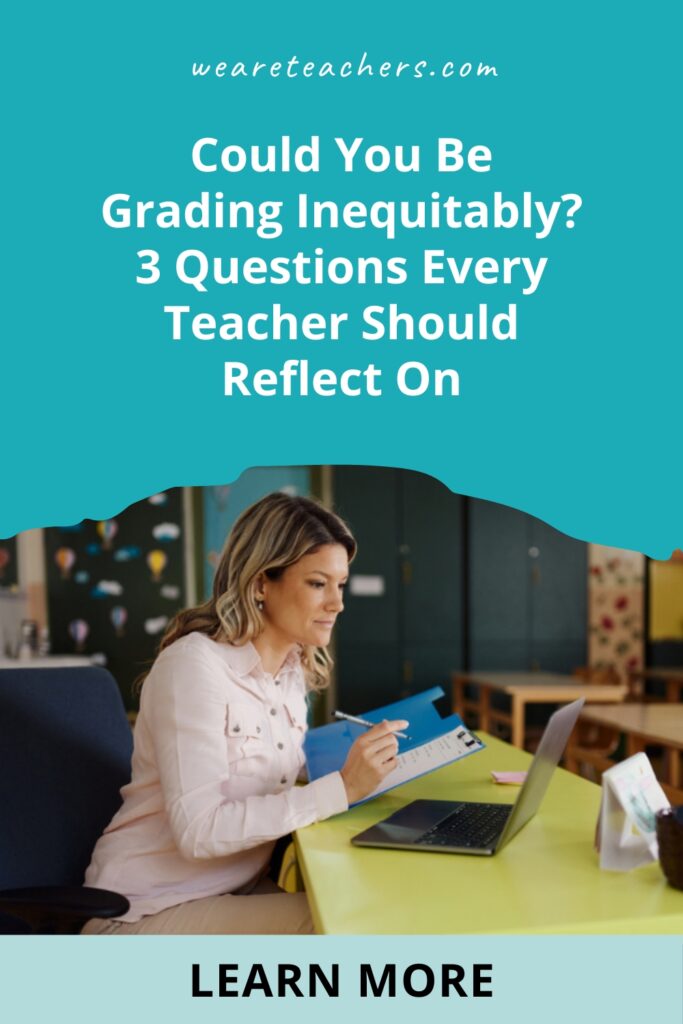Most teachers believe that they grade fairly. But how many have had the opportunity to reflect upon those grading practices?
I, too, used to believe I was a fair grader. But unfortunately, I never learned more about the full scope of grading equity practices. Sure, I understood the mathematical inconsistency with the 0-to-100-point scale and traditional letter range scale. We all know the average of a 0 and 100 is a 50, yet the average of an F and an A is a C, and a 50 is not. I never put anything lower than a 50 in the grade book. But I was still employing many inequitable grading practices because I fully believed they were best for my students, just like many other teachers do.
My understanding of equitable grading didn’t change until a study was conducted in my classroom that measured students’ motivation in how they were graded. In my transition from the classroom to an education policy researcher, I’m finding more teachers like me—teachers who believe they are grading fairly but haven’t explored or trained in equitable-grading practices.
Maybe we are grading students the best way we know how, and at the same time, perhaps we still have more practices to learn for the sake of our students. These three reflective questions could help challenge us and gauge our current grading practices:
1. Am I grading solely on content or standards mastery?
Common inequitable grading practices I used:
- Allowing extra credit opportunities. Extra credit can reward students for factors outside their control. This can contribute to further widening the opportunity gap. Moreover, extra credit can undermine the value of regular assignments that could be linked to course standards, further inflating a student’s grade and perpetuating grade unreliability.
- Grading some assignments on a curve. Grading on a curve is problematic for students. It doesn’t fully capture a student’s current understanding of a learning standard. In addition, students could receive higher or lower grades than they deserve after a grade is curved, regardless of their content knowledge—further making this grading practice inaccurate.
- Allocating 25% of their final grade for participation. While we want students to try, we shouldn’t give students any points for trying harder or working harder than we perceive as not trying or working. Factoring in unquantifiable behaviors like effort creates an even further unreliable grade.
2. Am I allowing my students multiple opportunities to demonstrate their current understanding or mastery of the content?
Sadly, I didn’t always allow retakes on assignments. If I did, I would average in the new grade with the old one. Not allowing retakes or multiple assessment opportunities doesn’t inform us of where students are currently learning. Averaging the old grade with the new one doesn’t make much sense for equitable-grading practices because we are trying to capture students’ progress. Maybe we want students to learn there are consequences to low grades or performing poorly, and that’s why we keep the lower grades in. This brings us to the next reflective question.
3. Do I take into account students’ behavior in my grading?
A student’s grade should reflect their content knowledge, not behavior. This point is understandably difficult for many teachers, especially when our education funding creates large class sizes and administrators who are spread too thin to support teachers effectively. We want to use the grade as a motivational carrot, though we know this practice is harmful to students’ motivation. Plus, we often believe we’re preparing students for the “real world” by grading behavior. For teachers wary of removing the behavior component from their grading due to lack of support from administration, there is evidence that implementing fairer grading practices improves student behavior in classrooms.
Here are some common ways I used to grade student’s behavior:
- Allocating 25% weight of their final grade to participation
- Taking 20 points off each day an assignment was late
- Grading assignments on completion
- Bumping up a student’s grade if I know they “tried”
Punctuality and turning in assignments on time are learnable soft skills without being averaged in the final grade. Other soft skills teachers can often find ways to average in the final grade are teamwork, communication, creativity, critical thinking, leadership, and persistence. Researchers report these components are essential for children to learn. Still, we need report cards that say where students are on standards alongside individual soft skill behaviors, like agency, collaboration, attitude, etc.
Grading assignments on completion does not accurately reflect a student’s mastery of the content. Additionally, grading homework on completion can disadvantage students who may struggle with a lack of time or support at home. For example, a student could behave and complete the homework but still struggle with the material. Further, researchers argue homework altogether disadvantages students with little home support.
And lastly, and maybe the most inequitable grading practice, fudging a student’s final grade if we feel like they “tried.” Grades should be bias-resistant, reliable, and accurate, and the only way to ensure this happens is by aligning all grades in the grade book to a standard. When we alter the final grade using a personal judgment, we invalidate the integrity of all grades assigned to our students.
Overall, traditional grading practices have needed an overhaul for decades as they are associated with school inequity. Professional development opportunities centered around grading equity practices are needed for teachers to consider how they could be grading more fairly. But even if these opportunities aren’t provided, these three reflective questions are an excellent place to start. (Plus, check out our post on standards-based grading here.)
What are your thoughts on these grading questions? Let us know in the comments.




















